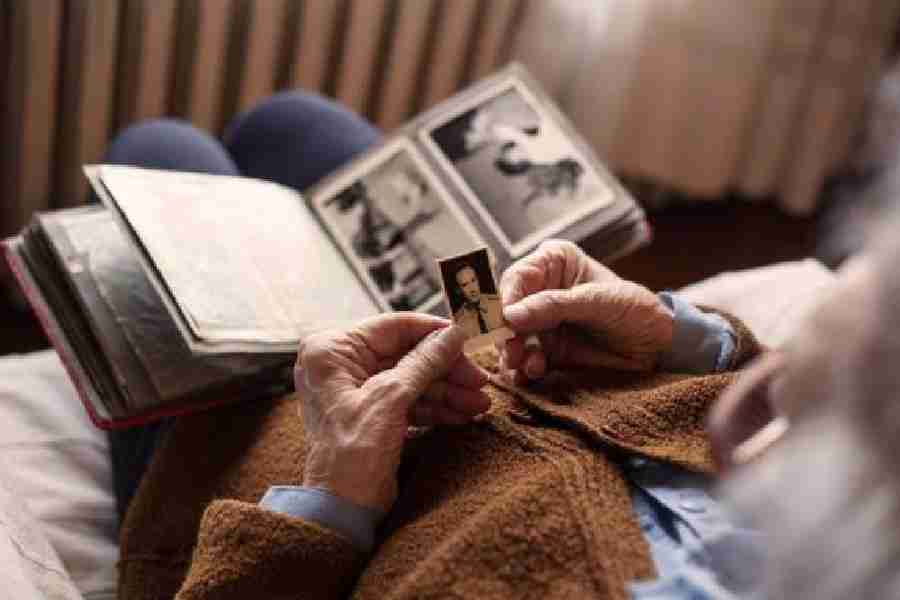If life in old age can be pictured as a series of subtle, painful manoeuvres of the self “between the clock and the bed” — a throwback to one of the later self-portraits of Edvard Munch — and with no options to end it all with a dignified flourish or a scream — what makes the face-off worse is the constant blurring of anchor points within time and memory and the slow, miserable, irretrievable withering of the self, long before death effects a closure. Time Shelter is a novel about this sad last game that plays out in human minds while they come to terms with Alzheimer’s, or what is generally called memory loss. “There is one monster that stalks every one of us,” says the narrator of Time Shelter —“Death, you’ll say, yes, of course, death is his brother, but old age is the monster.”
The book is not a feel-good, comfortable read; its strengths lie in making you feel terribly uneasy, especially if you know people who are battling memory loss. Unlike Brian Aldiss’s Greybeard, here, there’s no resolute, ageing hero struggling across withered dystopian landscapes of a post-industrial Great Brexittania, defying old age in the manner of the mythical Odysseus. Instead, there’s a nondescript geriatric psychiatrist, who might or might not be a mysterious thirteenth-century writer called Gaustine — a “vagrant in time” — or a good friend of the narrator, who sets up a “clinic for the past” in Switzerland, in sync with the internal times of people for whom “the present is a foreign country, while the past is their homeland.”
What therapeutic purposes might this clinic serve, wonders the narrator. Gaustine is uncertain at first — there are no proven records that long-forgotten sights and smells might help regenerate neural synapses of people whose memories have turned into fumes. But he believes that there’s the need to create a “protected past” for them: “it gives these people the right to happiness, to a memory of happiness, to be more precise.” They start collecting functional old radios, vinyl records and typewriters, yellowing magazines and newspapers, furniture, curtains, wallpapers, perfumes, cigarettes, and other minutiae, carefully recreating each room of the clinic according to styles and nostalgic tics associated with each of the forgotten decades of the twentieth century. And before long, elderly people start flooding into this clinic — and their stories unfold, in terms of what fades and what remains of their waking lives and dreams.
Vignettes, loosely sequenced, and merging perception with recognition outline the real or imagined lives of solitary humans who had peopled eastern Europe in the long twentieth century. A man calledMr. N., as if listening to the life story of a stranger, collects bits and pieces of his life from the recollections of a senile police informer — both of them have outlived Soviet-style socialism in Bulgaria but it continues disfiguring their present. Another scarred man vividly remembers his life in the United States of America and reminisces about the crowds attending Simon & Garfunkel’s 1981 concert in Central Park, New York City, except for the fact that he never left eastern Europe. He was somehow re-imagining his past, dimly remembered from the letters of a friend who once made it across the Iron Curtain.
The past is not what had happened, but what is righteous, meaningful, enlivening to the present. That this clinic operates in a “euthanasialand” called Switzerland adds another layer of poignancy to the telling. ‘Assisted suicide’ might sound ennobling, but it is more unreal than a ronin’s quest for dignity in death in Masaki Kobayashi’s Harakiri. Euthanasia costs money, caustically observes Gospodinov, to the order of 10,000 Swiss francs: “Sterbetourismus is for people of means, the poor don’t use euthanasia.”
There are uncomfortable lessons waiting for Gaustin and the narrator as well as they unwittingly gain access to their patient’s memories. An elderly woman, Mrs. S., becomes hysterical every time she sees a shower; they learn about her surviving Auschwitz, while the memories she tried suppressing throughout her life hit her like an oncoming train. Soon, not just people with Alzheimer’s but a great number of ‘healthy’ people seek sanctuary in this time shelter, hoping to escape the horrors of the present. The clinic totters as it disrupts the fabric of reality. And as the world becomes a “chaotic open-air clinic of the past”, “global dementia” follows.
Gospodinov narrates the story of Gaustine’s experiments with compassion and melancholy, and with a reticence that is unsure about what to say about our efforts to hold on to the past and memory in this world of increased life spans, consumer utopias, and ersatz electronic memories, but where it is generally forgotten that someone out there loses out to dementia every three seconds. It is not the forgetting but the normalcy surrounding this forgetting that hits you hard.










